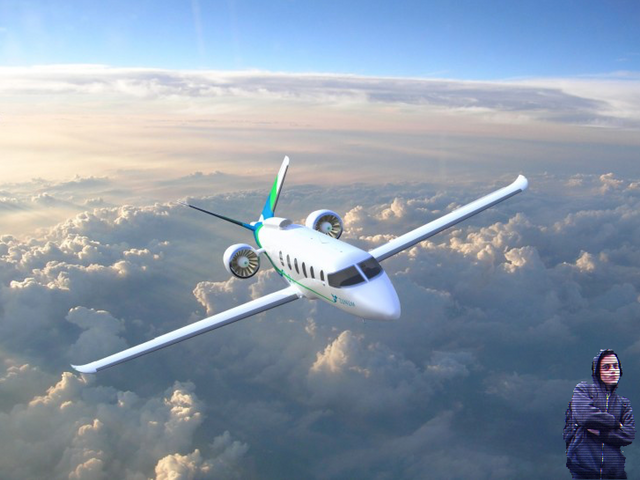// Technology NEWS // Will We Ever Be Able to Fly in Electric Planes?
Social pressure is mounting for the switch from air transport to cleaner energy than kerosene. But technological solutions will take time to implement for airliners.

Air traffic is growing rapidly and is expected to double by 2037, according to IATA (International Air Transport Association).
With the prospect of further increasing the greenhouse gases released into the atmosphere. Difficult to accept for some citizens who have chosen to boycott the plane.
Industrialists are fully aware of this and are finally taking action to fly cleaner. But the game is far from over...
The problem is that there is currently no prospect of one day flying a fully electric passenger aircraft.
"If you have a hundred passengers to carry, it's heavy. To achieve this, very large batteries would be required, weighing even more on the aircraft. A real vicious circle," explains Damien Fauvet, president of the start-up Turbotech, which develops on hybrid turbojet engines that are half electric and half kerosene.
He adds :
"There is also the problem of the battery life cycle. These are in high demand and will have to be changed regularly. And it won't really be environmentally virtuous to have to extract a lot of lithium".
Finally, there is also a question about operating cost. If the plane has to be stopped for several hours each time it recharges, the company will make fewer rotations and it will cost it much more.
Towards hybrid systems
To begin with, Safran is working on a solution that already allows aircraft to run on the tarmac with their engines off.
This is the Electric Taxiing system, which Airbus intends to adopt by 2022 with 4% fuel savings. It's always good to take.
But what every automaker dreams of is a hybrid electric/kerosene system. Such as, for example, Turbotech's, which will allow aircraft to take off and land electrically, while the cruise phase will use kerosene.
For its part, Onera is presenting the Dragon model at Le Bourget, a search configuration for an airliner of the size of an A320, capable of carrying around 150 passengers and traveling up to 1400 kilometers.
The originality of the concept is its distributed propulsion system, which is based on 20 electric motors integrated into each of the wings and powered by two turbines at the rear.
"This would save 15% of kerosene today and 25 to 30% within 15 years thanks to future advances in components," explains Peter Schmollgruber, a researcher at Onera.
The time for testing and industrialization, the prospect of the adoption of such hybrid airliners will not occur until 2040. It's still a long way off.
Hydrogen raises hopes
Safran is also supporting a project with Airbus and Daher for a hybrid distributed propulsion aircraft, both thermal and electric.
It is the Ecopulse demonstrator, also visible at the show this week.
At the front, on the nose of the aircraft, is the combustion engine. And integrated into the wings, six electric motors.
Let us move away from the very controversial bio-fuels issue. The latter is even more polluting than fossil fuels, due to their indirect emissions from agricultural production, according to Greenpeace.
The hydrogen path seems more promising but remains to be explored. However, it is possible that hydrogen may one day be successfully stored at high pressure.
Air Liquide has invested in the Hycarus project with Dassault Aviation and the CEA, in order to use a fuel cell on board for secondary functions such as toilets or heating dishes served to customers.
Singapore-based HES Energy Systems is designing a small aircraft that flies entirely on hydrogen.
Will flying taxis be the first to fly electrically?
In the meantime, the most significant progress should be made on smaller aircraft, private aircraft or VTOL (vertical take-off and landing), also known as flying taxis.
Uber, Boeing, and Airbus are actively working to set up these urban services for short shared and on-demand journeys.
These devices could start operating in three or four years with hybrid systems. And we can hope that they will be able to do without fossil fuels by 2025, by switching to all-electric power.
All eyes were focused this year on an Israeli start-up, Eviation Aero.
She presented Alice, a nine-seat, all-electric aircraft, capable of traveling 1000 km with complete autonomy.
The American regional airline Cape Air has already placed an order.
Sources : IATA, Safran and Futura Sciences

I've made a lot of articles with tools, explanations and advises to show you how to protect your privacy and to secure your computer, GO check them out!
This is my guide To Secure your PC after a fresh installation of Windows
If you think that your Phone or your PC has been hacked, you have to check it right now!
That's how you can be more Anonymous on the internet!
The Future of Cyber-Security, what to expect?
The best Crypto debit card – Wirex!
These are the best VPN to protect your numeric life: NordVPN, ExpressVPN and CyberGhost!
Your PC is slow? That's why!
Why is it important to Be Discreet on the Internet
Feel hot? Your Computer also!
How an Adware works?
That's how you should guard against Trojan!
What are the different Types of hackers?
